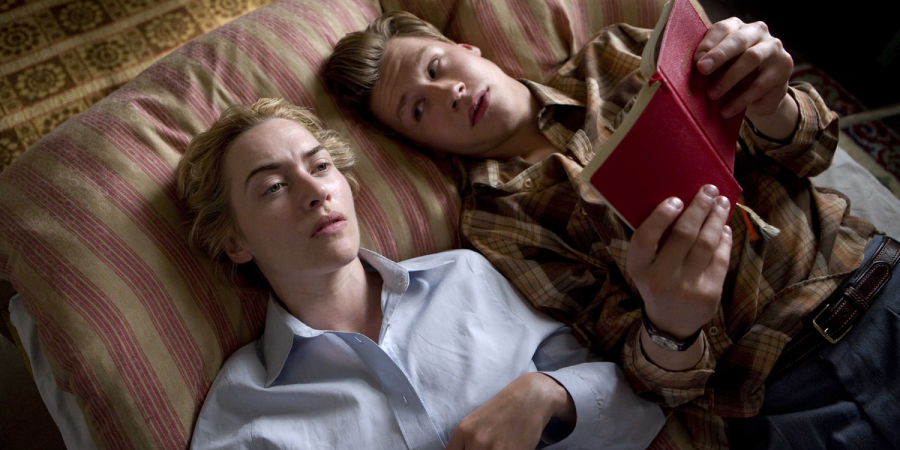

In Berlin in 1995, Michael Berg was shy with a woman and divorced. He sees a train go by as it takes him back to a 1958 tram ride. Michael, 15, gets off the tram to stroll in the rain but feels unwell. Tram conductor Hanna Schmitz, 36, discovers him puking next to an apartment building, cleans him up, and assists him in getting home. Michael has been diagnosed with scarlet fever.
When Michael feels better, he thanks Hanna by giving her flowers. He finds her as the ticket collector on a tram. Following her every day to her home, they grow into an affair. Every evening, Michael returns from school, and they meet. Slowly, they fell in love with each other. Suddenly, one evening, She requested that he read to her from his course materials and then make love. He complies with what she wants each day, and they later engage in a summer romance.
She goes out with Michael. Hanna is impressed as they visit a church with a choir while riding. Hanna advances to the tram's corporate office towards the end of the summer. She sends him packing after a disagreement and leaves without telling him. Michael is heartbroken to discover her apartment empty.
At present, Michael has been alienated from his daughter once more, in 1995.
Michael, a student at Heidelberg University's law school, attends the trial of six former SS guards accused of allowing 300 Jewish women and children to perish in a burning church during the death march in Kraków, Poland, in 1966. The trial is analogous to the Frankfurt Auschwitz trials. When Michael learns that Hanna is a defendant, he is appalled. The principal witnesses are Rose Mather and Ilana Mather. Ilana claims that Hanna read to her in the night using campgirls. Apart from her and Ilana, according to Rose, everyone else perished when the chapel caught fire after a bombing attack when the guards locked the doors.
Hanna acknowledges, contrary to her co-defendants, that Auschwitz was a concentration camp and that she and the others chose ten women for each Selektion period. When the court inquired about the church fire, nobody explained why they hadn't unlocked the doors. They were unaware of it until the following morning, the guards reported. Hanna acknowledged that it was a fabrication and that the doors had not been opened to prevent the convicts from escaping.
Then, Hanna's co-defendants fabricated that she was in charge and drafted the report. Hanna rejects this, saying that all the security guards present approve of the report's content. She refuses to provide the chief judge a sample of her handwriting out of embarrassment and says she wrote the piece. Michael discovers Hanna's secret while watching the trial from the public gallery: she is illiterate and could not have read or written it.
When Michael tells his law professor, the professor advises him that it is his moral duty to let the court know. The professor tries to see Hanna in prison. Michael tries to visit Hanna in jail because he feels guilty about not having spoken to her, but he finds it hard to do so and leaves her waiting. The other suspects receive sentences of four years and three months apiece for aiding and abetting, while she receives a life term for 300 murder cases. Michael sobs in the audience.
Years later, while Hanna is behind bars, Michael regularly mails her recordings of the novels he had previously read to her. She borrows the same books from the prison library and teaches herself to read and write using Michael's voice. She progressively gains literacy as she writes to Michael, but he never replies.
In 1988, a jail officer calls Michael and requests that he help Hanna reintegrate into society after her release. He initially says "No" but then stops by to let her know that he has secured her a place to live and a job. After seeing him, she tries to contact him, but Michael is unresponsive. Hanna emphasizes that he is talking about their past when he inquires about her memory of the past, he says, “No, not about them,” which hurts Hanna. She responds that it doesn't matter what she feels or thinks when he says he's referring to the conflict since "the dead are still dead." Both are now angry.
Then Hanna decides to kill herself. Michael arrives with flowers on the day Hanna is released from jail but learns she hanged herself. She left Ilana a gift of a tea tin filled with cash and her bank account's balance.
Michael discovers Ilana in New York City and acknowledges his relationship with Hanna and its lingering effects. He informs her of Hanna's illiteracy, but she advises him to look elsewhere for catharsis. When Michael explains what she left behind and shows her the tea container, Ilana declines his offer for the money. Ilana concurs that he should donate it to a Jewish literacy organization in honor of Hanna if he chooses to do so. Since the tin resembles one she used to own, she keeps it.
In 1995, Michael takes his daughter Julia to visit Hanna's cemetery while narrating the tale of his past.
